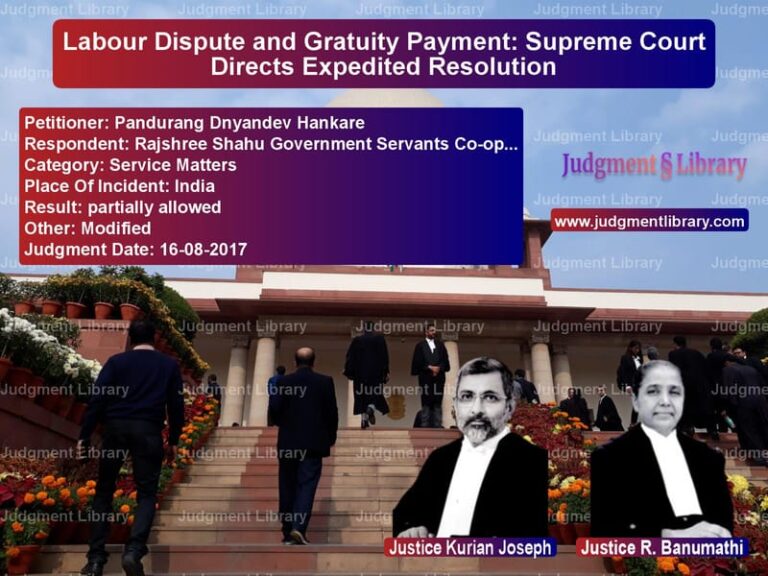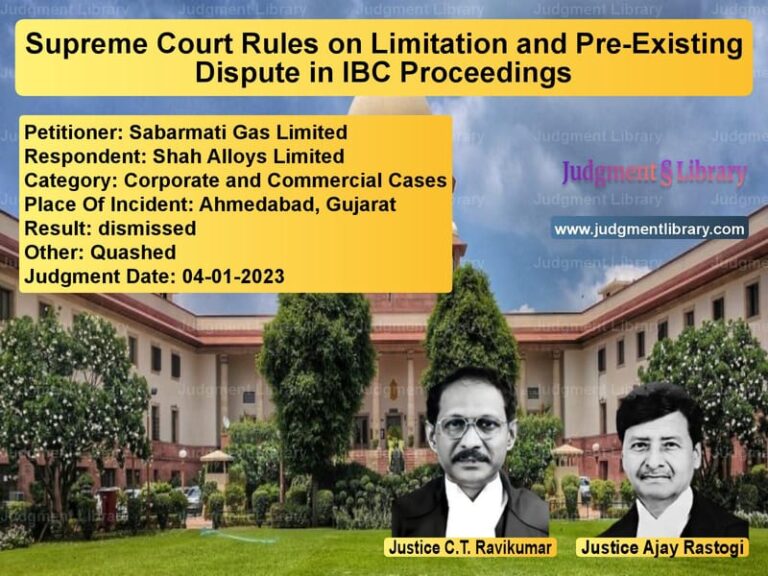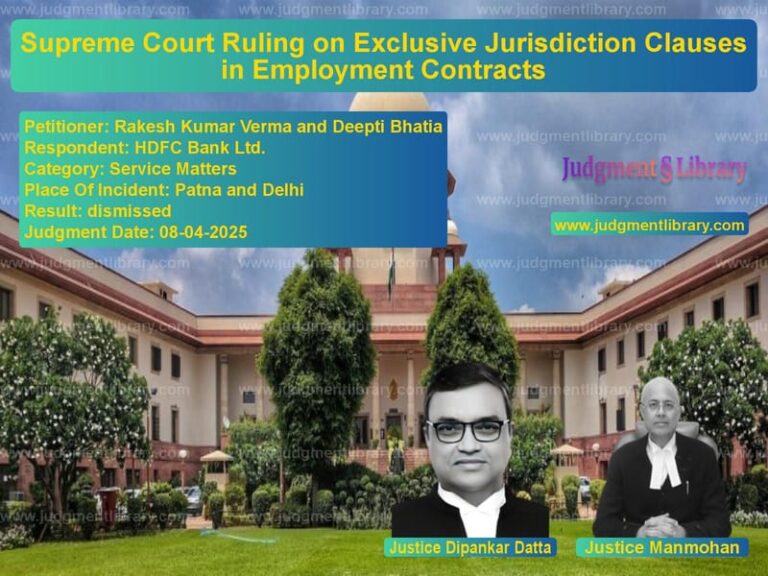Supreme Court Upholds Maxim India’s Ownership in Karnataka Land Dispute
The Supreme Court of India has delivered a significant ruling in the case of M/s Maxim India Integrated Circuit Design (P) Ltd. vs. Andappa (D) By LRs & Others, resolving a decades-long land ownership dispute in Jakkasandra village, Karnataka. The ruling reaffirms the principle of finality in legal proceedings, prevents misuse of judicial delays, and upholds the rightful ownership of Maxim India over the disputed property.
Background of the Case
The dispute revolved around a land parcel in Jakkasandra, originally purchased by Messrs Chinnappa and Munniappa from Munivenkatappa. After Chinnappa’s demise, his legal heirs, including D. Munniappa and A.C. Munniappa, inherited rights over the property. Over time, disputes arose as multiple parties laid claim to the land, particularly under the Karnataka Land Reforms Act, 1961.
The respondents, primarily Andappa and others, sought occupancy rights under the Act, filing multiple tenancy petitions claiming they had been cultivating the land for decades. However, their claims faced multiple setbacks in judicial proceedings.
Legal History
Tenancy Petitions and Ownership Dispute
- In 1981, the Karnataka Land Tribunal dismissed the tenancy petition (LRF No. 835/74-75) filed by Andappa and others, ruling that they failed to establish tenancy rights.
- Despite this dismissal, Andappa continued to claim ownership, leading to multiple legal challenges.
- The land was mortgaged and later sold to N.D. Mani, who transferred it to Basant Kumar Patil.
- Maxim India subsequently purchased the land in 2004 through a registered sale deed, based on previous legal transactions and land mutation records.
High Court Proceedings
- In 2006, Andappa challenged Maxim India’s ownership in Writ Petition No. 36236/1995.
- The Karnataka High Court ruled in favor of Andappa, setting aside the mutation of records in favor of Maxim India.
- The High Court’s decision was based on condoning an excessive 1378-day delay in filing an appeal, which Maxim India argued was unjustified and procedurally incorrect.
Arguments by the Appellants (Maxim India)
Maxim India put forth several legal contentions, arguing that:
- The Karnataka High Court erred in condoning a 1378-day delay in favor of Andappa, allowing him to challenge a settled matter.
- The tenancy petition had been dismissed in 1981, and any subsequent claims were legally untenable.
- Andappa manipulated land records, changing names and other details to misrepresent facts before judicial forums.
- The property was legally acquired through a registered sale deed, and mutation records accurately reflected Maxim India’s ownership.
- The lower court failed to consider the finality of the Land Tribunal’s 1981 order and the subsequent legal transactions that validated Maxim India’s ownership.
Arguments by the Respondents (Andappa & Others)
The respondents, including Andappa, contended that:
- The land was originally agricultural, and they had cultivated it for decades.
- The Karnataka Land Tribunal dismissed their tenancy petition on technical grounds, not on merit.
- The High Court correctly ruled in their favor, acknowledging their longstanding possession of the land.
- Maxim India’s acquisition of the property was illegal as it disregarded their tenancy rights.
Supreme Court’s Analysis and Ruling
1. Delay in Filing Appeal Was Unjustified
The Supreme Court ruled that the Karnataka High Court had erred in condoning a 1378-day delay. The Court emphasized that such an extraordinary delay disrupted the principle of legal finality:
“Litigants cannot be allowed to revive settled matters after an unreasonable delay, causing unnecessary hardship to rightful owners.”
2. Tenancy Petition Had Attained Finality
The Court reaffirmed that the tenancy petition was conclusively dismissed in 1981 and could not be revisited:
“Once a matter has been conclusively decided, subsequent claims based on the same facts are legally untenable.”
3. Ownership Rights of Maxim India Upheld
Recognizing the legitimacy of Maxim India’s acquisition, the Court stated:
“The sale transaction was lawful, and the mutation records correctly reflect Maxim India’s ownership. The High Court’s interference was unwarranted.”
4. Prevention of Judicial Misuse
The Court criticized the attempt to manipulate legal proceedings through procedural delays and observed:
“Allowing litigants to misuse procedural delays as a tactic to revive time-barred claims would disrupt legal certainty and cause undue hardship to bona fide property owners.”
Final Judgment
The Supreme Court ruled:
“The judgment in Writ Appeal Nos. 1708, 1705, 1707, 1709, 206, and 1738 of 2006 is set aside, and the ownership of Maxim India is restored.”
Impact of the Judgment
This ruling establishes several key legal principles:
- Finality in Land Disputes: Once a judicial decision attains finality, subsequent challenges on the same grounds cannot be entertained.
- Protection Against Procedural Abuse: The Court reinforced the need to prevent misuse of judicial processes through excessive delays.
- Legal Ownership vs. Possession Claims: Mere long-term possession does not establish ownership if legal title is absent.
- Importance of Mutations and Registered Transactions: Land records and sale transactions hold strong evidentiary value in ownership claims.
Conclusion
This judgment reaffirms the principle that legal finality must be respected in property disputes. The Supreme Court’s decision prevents undue interference in settled ownership claims and ensures that rightful property owners are protected against frivolous legal challenges. By quashing the Karnataka High Court’s ruling, the Court has safeguarded the rights of individuals who acquire property through legally valid transactions, upholding the sanctity of property laws in India.
Petitioner Name: M/s Maxim India Integrated Circuit Design (P) Ltd..Respondent Name: Andappa (D) By LRs & Others.Judgment By: Justice C.T. Ravikumar, Justice Sanjay Kumar.Place Of Incident: Jakkasandra, Karnataka.Judgment Date: 02-01-2025.
Don’t miss out on the full details! Download the complete judgment in PDF format below and gain valuable insights instantly!
Download Judgment: ms-maxim-india-inte-vs-andappa-(d)-by-lrs-&-supreme-court-of-india-judgment-dated-02-01-2025.pdf
Directly Download Judgment: Directly download this Judgment
See all petitions in Property Disputes
See all petitions in Contract Disputes
See all petitions in Specific Performance
See all petitions in Judgment by C.T. Ravikumar
See all petitions in Judgment by Sanjay Kumar
See all petitions in allowed
See all petitions in Quashed
See all petitions in supreme court of India judgments January 2025
See all petitions in 2025 judgments
See all posts in Civil Cases Category
See all allowed petitions in Civil Cases Category
See all Dismissed petitions in Civil Cases Category
See all partially allowed petitions in Civil Cases Category







